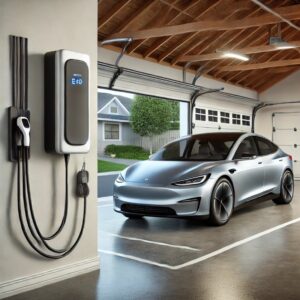Introduction to EV Charger and Load Calculation
Understanding the basics of EV charger installation and load calculation is essential for safe and efficient home charging. Installing an EV charger isn’t just about plugging it into your existing electrical system; it requires careful planning and load calculation to ensure safety and compliance with regulations.
Overview of EV Charger Installation
Installing an EV charger involves more than just finding a convenient spot in your garage. Integrate the charger with your home’s electrical system, ensure the wiring can handle the additional load, and comply with local electrical codes. This involves selecting the right charger, determining its placement, and planning necessary electrical panel upgrades.
Importance of Load Calculation
Load calculation is crucial to determine whether your home’s electrical system can support the additional load of an EV charger. It helps prevent overloading circuits, which can lead to electrical failures or even fires. Accurate load calculations ensure that the system operates efficiently and safely, balancing the demand between your existing electrical usage and the new EV charger.
Safety Considerations
Safety is paramount when installing an EV charger. Proper load calculation ensures that the electrical system can handle the new load without compromising safety. This includes considering the charger’s power requirements, the capacity of your electrical panel, and the overall condition of your home’s wiring. Adhering to safety standards and using certified equipment can prevent potential hazards and ensure a reliable installation.
Regulatory Requirements
Local building codes and regulations often dictate specific requirements for EV charger installations. These regulations are designed to ensure safety and reliability, and understanding them is a key part of the load calculation process. Compliance with these codes involves obtaining the necessary permits, following installation guidelines, and ensuring that all electrical work is inspected and approved by local authorities.
Tools and Resources Needed
Accurate load calculation requires specific tools and resources, including load calculation software, electrical system schematics, and professional guidelines. These tools help ensure that calculations are precise and comply with regulations. Additionally, consulting with a certified electrician can provide valuable insights and help you navigate the complexities of load calculation and installation.
Common Mistakes to Avoid
Common mistakes in load calculation include underestimating the total load, ignoring peak load demands, and failing to consider future electrical needs. Avoiding these mistakes is critical for a safe and efficient installation. Proper planning, using accurate data, and regularly reviewing your electrical system’s capacity can help prevent these issues and ensure that your EV charger operates smoothly and safely.
Key Factors in EV Load Calculation
When performing an EV load calculation, several key factors must be considered to ensure the electrical system can handle the additional load safely and efficiently. These factors help determine the capacity of your system and ensure that your EV charger operates without causing any electrical issues.
Determining Electrical Load Capacity
The first step in load calculation is determining your home’s electrical load capacity. This involves evaluating the capacity of your main electrical panel and any subpanels, as well as the rating of your service connection. Understanding your system’s capacity helps identify if it can support the additional load of an EV charger or if upgrades are needed.
Assessing Existing Electrical System
Before adding an EV charger, assess your existing electrical system to identify any weak points or areas that need upgrading. This includes checking the condition of wiring, circuit breakers, and other components. An assessment ensures that your system is in good condition and capable of handling the new load safely.
Calculating Additional Load from EV Chargers
Calculating the additional load from the EV charger involves considering the charger’s power requirements and how they will integrate with your home’s current electrical load. This calculation is essential to ensure your system can handle the extra demand. Factors such as the charger’s amperage and voltage play a crucial role in this calculation.
Peak Load vs. Continuous Load
It’s important to differentiate between peak load (the maximum load your system can handle for short periods) and continuous load (the load your system can handle over extended periods). Both factors are crucial in load calculation. Peak load considerations help prevent temporary overloads, while continuous load considerations ensure long-term stability and efficiency.
Impact of Other Household Appliances
Other household appliances can significantly impact your overall load calculation. High-demand appliances like air conditioners, electric stoves, and dryers need to be considered to avoid overloading circuits. Understanding the combined load of all appliances helps in planning and prevents potential electrical issues.
Planning for Future Load Increases
Planning for future load increases is essential. As you add more electrical devices or upgrade your home’s energy system, your electrical load will increase. Factoring this into your load calculation ensures long-term safety and efficiency. This proactive approach helps accommodate future needs without requiring frequent upgrades.
By considering these key factors, you can perform an accurate and reliable load calculation, ensuring your electrical system can support the additional load of an EV charger safely and efficiently.
Steps to Perform an Accurate Load Calculation
Performing an accurate load calculation is a systematic process that involves gathering data, using formulas, and sometimes consulting professionals. This ensures that your electrical system can handle the additional load of an EV charger safely and efficiently.
Gather Necessary Data
Start by gathering all necessary data, including your home’s current electrical load, the specifications of your EV charger, and any other relevant information about your electrical system. This data collection is crucial for understanding the baseline capacity of your system and the additional load the EV charger will introduce.
Use of Load Calculation Formulas
Use standard load calculation formulas to determine the additional load your EV charger will add to your system. These formulas take into account various factors such as voltage, current, and power. By applying these formulas correctly, you can estimate the impact of the new load on your existing electrical system.
Understanding Load Diversity
Load diversity refers to the variation in power demand from different appliances and devices. Understanding this concept helps in creating a more accurate and realistic load calculation. It accounts for the fact that not all devices operate at full capacity simultaneously, allowing for a more balanced and efficient load distribution.
Using Software Tools for Calculation
There are various software tools available that can simplify the load calculation process. These tools use algorithms to calculate load requirements accurately, considering all relevant factors. Using these tools can save time and reduce the risk of human error in the calculation process.
Consulting with a Certified Electrician
Consulting with a certified electrician ensures that your load calculation is accurate and complies with local regulations. Electricians have the expertise to identify potential issues and recommend solutions. Their professional assessment provides an added layer of confidence and safety for your EV charger installation.
Documenting and Reviewing the Calculation
Documenting and reviewing your load calculation helps in verifying accuracy and ensuring that all factors have been considered. This step is crucial for compliance and future reference. Keeping detailed records allows you to review and adjust your calculations as needed, ensuring long-term reliability and efficiency.
By following these steps, you can perform an accurate load calculation that ensures your home’s electrical system can safely support the additional load of an EV charger. This process not only enhances safety but also optimizes the performance and longevity of your electrical system.
Benefits of Proper EV Charger and Load Calculation
Proper EV charger and load calculation offer numerous benefits, ensuring your system is safe, efficient, and future-proof. These advantages span from enhanced safety to cost savings, making the investment worthwhile.
Enhanced Electrical Safety
Accurate load calculation enhances electrical safety by preventing overloading and reducing the risk of electrical fires and failures. By ensuring that your electrical system can handle the additional load of an EV charger, you minimize the chances of circuit breakers tripping or wiring overheating, which are common causes of electrical hazards.
Improved Charging Efficiency
Proper load calculation ensures that your EV charger operates efficiently, reducing energy waste and optimizing charging times. When your electrical system is well-balanced and capable of handling the load, your EV charger can deliver the required power consistently, leading to faster and more reliable charging sessions.
Reduced Risk of Overloading
By accurately calculating the load, you minimize the risk of overloading circuits, which can lead to power outages and damage to your electrical system. This proactive approach helps in maintaining the stability and reliability of your home’s electrical infrastructure, ensuring that all connected devices, including your EV charger, function smoothly.
Long-Term Cost Savings
Investing in proper load calculation and installation can lead to long-term cost savings by avoiding potential repairs, replacements, and energy waste. A well-calculated and properly installed system runs more efficiently, which can lower your energy bills. Additionally, by preventing overloading and electrical failures, you save on the costs associated with emergency repairs and replacements.
Increased Home Value
A well-installed EV charger and upgraded electrical system can increase your home’s value, making it more attractive to potential buyers. As electric vehicles become more popular, homes equipped with efficient charging solutions are seen as more modern and convenient, thus adding to their market appeal.
Environmental Benefits
Using an EV charger efficiently reduces your carbon footprint, contributing to a more sustainable environment by promoting the use of clean energy. Proper load calculation ensures that your EV charger operates at peak efficiency, maximizing the environmental benefits of driving an electric vehicle. This not only helps in reducing greenhouse gas emissions but also supports broader efforts toward energy sustainability.
By understanding and implementing proper EV charger and load calculation, you can enjoy these significant benefits, ensuring that your home’s electrical system is safe, efficient, and ready for the future.
Conclusion
Proper EV charger and load calculation are critical for safe and efficient home charging. By understanding and implementing these practices, you ensure your home’s electrical system can handle the additional load, enhancing safety, efficiency, and long-term savings. At Rising Sun Electrify, we are committed to providing top-notch EV charger installation and load calculation services to ensure your system is optimized for performance and safety.
Why Choose Rising Sun Electrify?
Choosing Rising Sun Electrify for your EV charger installation and load calculation needs ensures you receive expert service backed by years of experience and dedication to quality. Our certified electricians use the latest tools and techniques to perform accurate load calculations and installations, ensuring your home is safe and your EV charger operates efficiently.
Comprehensive Services
We offer a range of services designed to meet all your electrical needs, from initial consultation and load calculation to complete installation and post-installation support. Our team is equipped to handle any challenges, ensuring a smooth and hassle-free experience.
Customer Satisfaction
At Rising Sun Electrify, your satisfaction is our top priority. We pride ourselves on our professionalism, attention to detail, and commitment to exceeding your expectations. Our customer-first approach ensures that you receive personalized service tailored to your specific needs.
Contact Rising Sun Electrify Today
Ready to ensure your EV charger installation is safe and efficient? Contact Rising Sun Electrify Today to schedule your consultation. Let us help you optimize your home’s electrical system for the future of electric vehicle charging.
Choosing Rising Sun Electrify means investing in a safer, efficient, and future-proof electrical system for years. Don’t wait—reach out to us today and take the first step toward seamless and reliable EV charging at home.
FAQs
Q: Why do I need to perform a load calculation before installing an EV charger?
A: Load calculation ensures your electrical system can handle the additional load, preventing overloads and ensuring safety.
Q: How can I determine the load capacity of my home’s electrical system?
A: Consult with a certified electrician who can assess your current system and provide an accurate load calculation.
Q: What are the risks of not performing a proper load calculation?
A: Not performing a proper load calculation can lead to overloading circuits, electrical failures, and potential fire hazards.
Q: Can I use any EV charger with my home’s electrical system?
A: The EV charger’s compatibility depends on your home’s load capacity and the charger’s specifications.
Q: How often should I review my home’s load calculation?
A: It’s advisable to review your load calculation periodically, especially when adding new appliances or upgrading your electrical system.
Q: What should I do if my home’s electrical system can’t handle the additional load of an EV charger?
A: If your system can’t handle the additional load, you may need to upgrade your electrical panel or other components to safely accommodate the EV charger.











